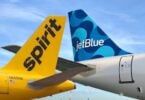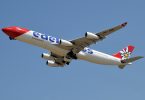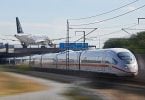It has been a tough year for those travelling across America, and while a summer of ‘revenge travel’ has now come to an end for Airlines (with more flights cancelled or delayed from in summer 22, than during the pre-pandemic summer of 2019), new research has shown that thousands of flights have been cancelled following the devastation of Hurricane Ian. With over 7,000 nationally between the 2nd and 8th October alone.
The Ngalaba Transportgbọ njem has said airlines should bear the brunt of the blame due to flight overscheduling, followed by confusing guidelines on compensating passengers in refunds or vouchers for these inconveniences.
With that in mind, airline industry experts surveyed 3,014 travelers and asked, hypothetically: ‘If an airline was to bump you off a flight, how much compensation would you accept to do so?’
Unfortunately for airlines, it seems this inconvenience caused to passengers doesn’t come cheap.
The average traveler said they would accept an amount no less than $283 to compensate for the inconvenience of having their booking cancelled or rescheduled on a different flight.
When broken down across states, this figure was highest in Alaska, where the average traveler would expect more than $534 for the inconvenience caused by a flight cancellation or rebooking.
Comparatively, travelers in Delaware appear to be more understanding of these kinds of cancellations and would accept an amount of just $86.
The Department of Transportation has created a website that aims to provide travelers with an explanation of each airline’s policies when it comes to flight delays and cancellations, making it easier for passengers to understand their rights.
Transportation Secretary, Pete Buttigieg, has also called these travel disruptions “unacceptable”, saying that U.S. airlines should offer meal vouchers to passengers suffering flight delays, as well as hotel lodging accommodations for those stranded overnight.
Despite this, more than half (65%) of respondents said they don’t believe the department is doing enough to help travelers in this regard.
According to Department of Transportation data, 3.2% of domestic flights were canceled by U.S. air carriers within the first six months of 2022 and given this, 61% of travelers said they believe flight cancellations have become the new norm. And given how these delays and cancellations have been increasing exponentially over the past few years, 69% also said they’re not optimistic that the travel situation will improve at all this year.
On a scale from 1 to 10 (with 1 being the least confident), the average traveler ranked themselves an average 5, in terms of being confident that their flight will not be delayed.
This explains why 53% also said that due to the increasing number of air carrier delays and cancellations, they’re actually more likely to travel to their destination by road instead, to avoid the risk of airport travel inconveniences completely.
It seems the cost of fuel is cheaper than the cost of inconvenience caused by airlines – and that’s saying something!























